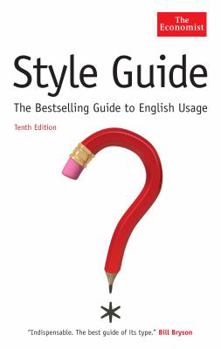The Economist Style Guide
Select Format
Select Condition 
Book Overview
The first requirement of The Economist is that it should be readily understandable. Clear writing is the key to clear thinking. So think what you want to say, then say it as simply as possible. Readers are primarily interested in what you are saying. The way you say it may encourage them either to read on or to give up. If you want them to read on, then: Catch their attention Do not spend sentences setting the scene or sketching in the background. Hold the reader by the way you unfold the tale and by fresh and unpretentious use of language. Read through your writing several times Edit it ruthlessly. Cut out anything superfluous. Unadorned, unfancy prose is usually all you need. Do not be stuffy Use the language of everyday speech, not that of spokesmen, lawyers or bureaucrats. Do not be hectoring or arrogant Nobody needs to be described as silly: let your analysis prove that he is. Do not be pleased with yourself Don't boast of your own cleverness by telling readers that you correctly predicted something or that you have a scoop. You are more likely to bore or irritate than to impress them. Do not be too chatty Surprise, surprise is more irritating than informative. Do not be too didactic Avoid sentences that begin Compare, Consider, Expect, Imagine, Remember or Take. Do your best to be lucid Simple sentences help.
Format:Hardcover
Language:English
ISBN:1846681758
ISBN13:9781846681752
Release Date:May 2010
Publisher:Wiley
Length:272 Pages
Weight:1.00 lbs.
Dimensions:8.8" x 1.1" x 5.8"
Customer Reviews
5 ratings
Excellent for non-native speakers
Published by Thriftbooks.com User , 17 years ago
Writing and speaking are the most difficult skills to learn if you're a non-native speaker. Even though most learners believe that speaking is more useful - and there is some vanity involved in it - it's actually writing that takes precedence in today's connected world. Most business communications today are done through email, and no one wants the recipient to have a laugh at their expense. Grammar, punctuation and vocabulary are important, for sure, but once you have mastered those, why not spend a few more hours dedicated to polishing a bit your written English? With just 160 pages, you get tips that will make your writing look formal, but not stilted; correct, but not pretentious. You may even have a laugh or two with the entries.
It doesn't get any better than this.
Published by Thriftbooks.com User , 18 years ago
I speak English as a second language. This style guide has been incredibly useful and informative. I have improved my writing even in other languages thanks to this book. It even is pleasurable reading. In the Guide's own style: Buy it.
Review of brazilian girl
Published by Thriftbooks.com User , 18 years ago
Very useful handbook for writing. It is fashioned similarly to other journalism guides of Brazilian newspapers, but it is far more witty. It brings a section about differences between American and British English - with clues I couldn't find anywhere else. Lots of vocabulary, as usual. It could bring more examples of good and bad practices, though. But I guess those you can find at live on the pages of The Economist itself. Enjoy your reading, Ruli.
Excellent Reference
Published by Thriftbooks.com User , 18 years ago
More than grammar. This book helps with style and it also has reference information on abbreviations, calendars, countries, currencies, science, geology, internet, latin, proofreading, stockmarket, world times, etc. It has many interesting sections.
Style guidance at its best
Published by Thriftbooks.com User , 22 years ago
Simple. Straightforward. Writing instruction as you would expect from perhaps the best magazine on the planet. Clear, concise, to the point. If you want to write well, then buy this book.





